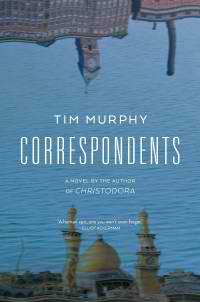Correspondents by Tim Murphy
 Friday, June 14, 2019 at 7:45AM
Friday, June 14, 2019 at 7:45AM 
Published by Grove Atlantic on May 15, 2019
I hate to use a book review cliché like “riveting,” but it fits. Correspondents tells a story that is intensely personal, while illuminating larger social, cultural, and political conflicts that have come to define America. The novel also brings to life the pain that America brought to Iraq and to its refugees when it bungled an invasion that was conducted under false pretenses, an invasion that was intended solely to advance American interests, not the interests of Iraqis.
Most of the novel covers a span from 2002 to 2009, but the story begins as a generational saga centered on the fictional Massachusetts town of Lawton, described as a melting pot that draws immigrants who work in mills so they can send wages to the families they left behind. The first chapter introduces the ancestors and siblings of Mary Jo Coughlin (a Catholic from Ireland) and George Khoury (a Lebanese Maronite), while the second describes their lives in the 1960s and 1970s. The third chapter, set in the 1980s, introduces their brainy and ambitious daughter Rita and her cousin Bobby, a descendent of the Coughlin branch. In a 2008 prologue, Rita brings her Jewish boyfriend Jonah to a Mahrajan in Lawton.
All of that is background to a larger story that begins in Iraq in 2002, where Nabil is a young man who is desperate to make a good life. His cousin is Asmaa, a bright and restless woman who teaches Nabil English. Both want life to change, but Nabil, unlike Asmaa, is not sure that it will change for the better if America invades the country.
Rita is in Beirut in 2002 as a Harvard-trained foreign correspondent. Bobby has enlisted in the military as a response to 9/11. As the invasion of Iraq seems imminent, Rita gets her career-making wish and is sent to Iraq to cover the war. Nabil is her warzone interpreter. Bobby is later sent to Iraq to assist with the occupation.
Most of the story takes place in Iraq after the fall of Saddam Hussein. Rita’s interviews reveal the mess that America made. The plan to win the hearts and minds of Iraqis was sabotaged by the indiscriminate bombing of neighborhoods, the mass incarceration of innocent people, and the failure to implement a post-invasion strategy to control the chaos of looters, car thieves, and random killings. All of that is depicted in vivid detail. The notion that deposing Saddam made Iraq free is debunked by characters who tell Rita that they are no longer free to walk on the streets without fear of being killed.
Americans learned some of that from journalists who were allowed to report the story, but as the novel suggests, many American journalists pulled their punches in the immediate aftermath of the supposed “victory.” Only later did they report the hypocrisy of imposing American-style democracy by force on people who were not allowed to decide for themselves whether they wanted a democracy. Almost two decades later, Iraq is still unstable, thanks to American interference with the country's governance. Rita’s realization that American foreign policy is toxic is one of the novel’s strongest moments.
The story is filled with dramatic moments, some involving Rita, others advancing Nabil’s story. One of the later chapters, set in the United States shortly before the 2008 election, focuses on a birther with mental health issues and a newly purchased gun, whose actions lead to a tragic moment that has an impact on Rita, Bobby, and the nation. The last few chapters touch upon important issues involving gun control (or its absence), PTSD, the darkness the pervades the lives of war survivors, the difficulty that refugees have while transitioning to American life, and the love of country (which many Americans can’t seem to fathom when the country isn’t their own).
Correspondents is smart, nuanced, and powerful. A key moment occurs when Rita inadvertently reveals the truth as she sees it — not a “balanced” story about post-invasion successes and failures, but an unvarnished, personal account of how devastating the invasion had been to people who, in its aftermath, lived in daily fear of kidnappers, looters, car bombers, and retribution. Correspondents dramatizes how journalism lost its way by refusing to report the truth from Iraq for fear of appearing biased, as if enabling propaganda by uncritical reporting of an administration’s statements is not itself a form of biased reporting. It tells that story — and the story of the war’s impact on Nabil and his family — in scenes that are all the more moving because of their realism.
HIGHLY RECOMMENDED
 TChris |
TChris |  Post a Comment |
Post a Comment |  HR,
HR,  Tim Murphy in
Tim Murphy in  General Fiction
General Fiction